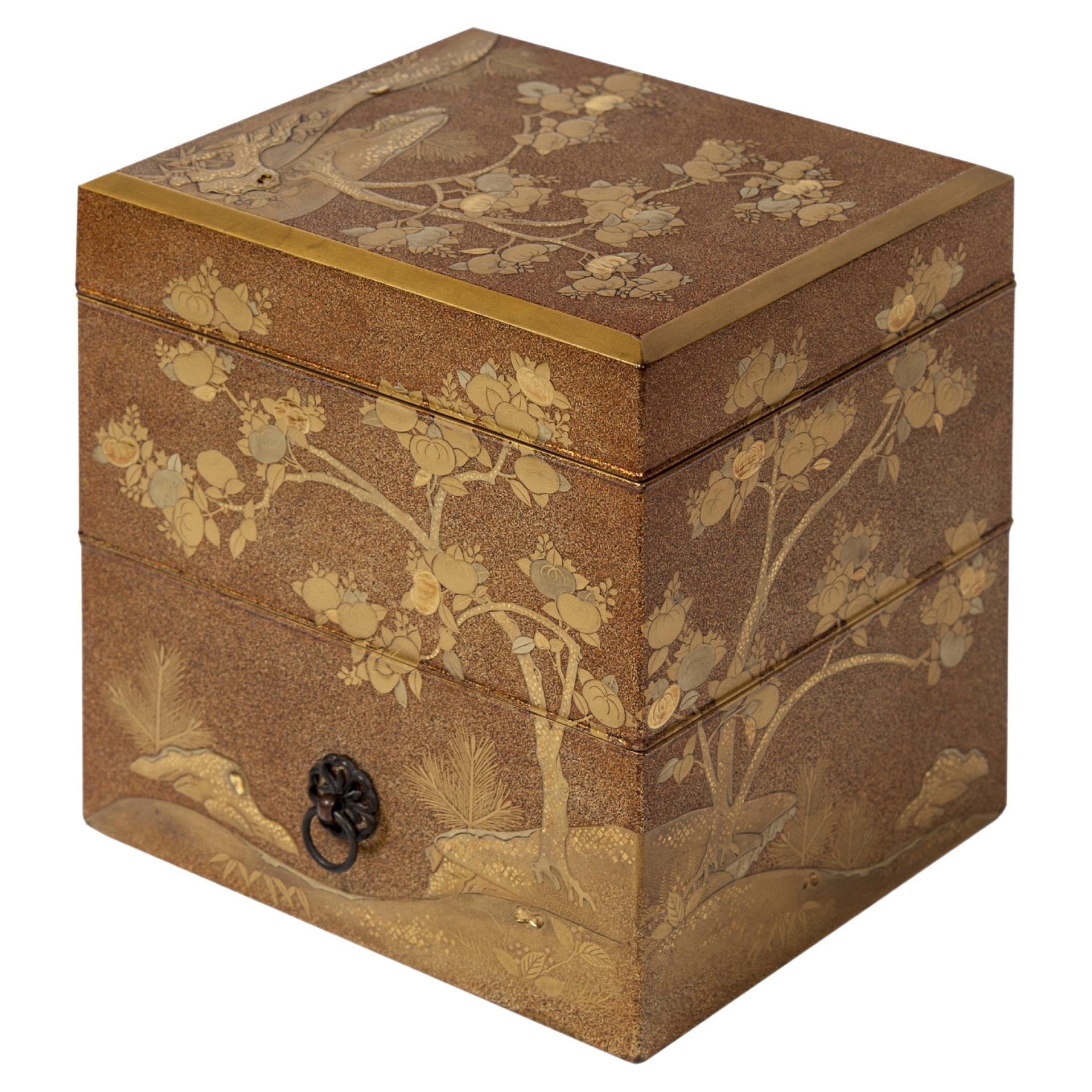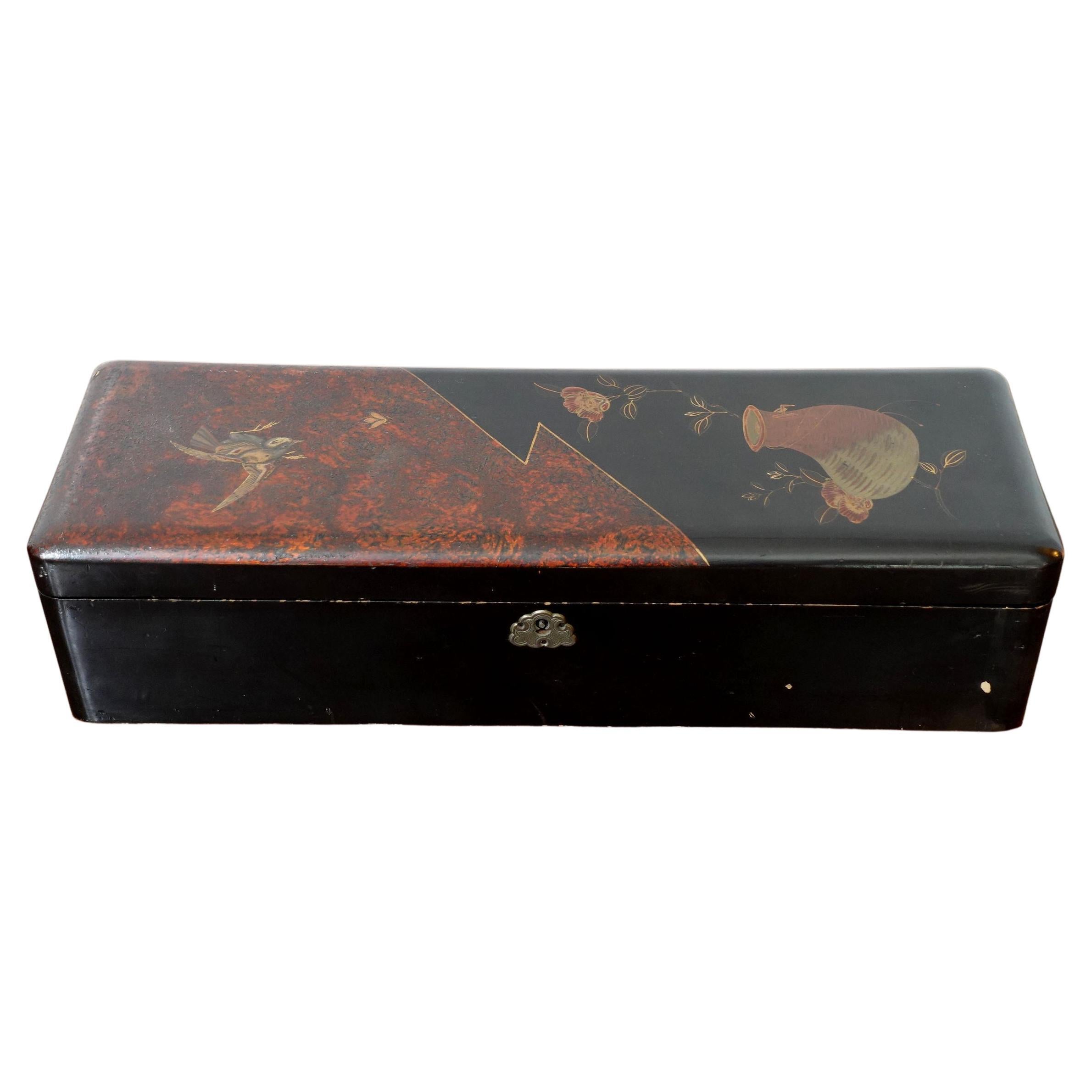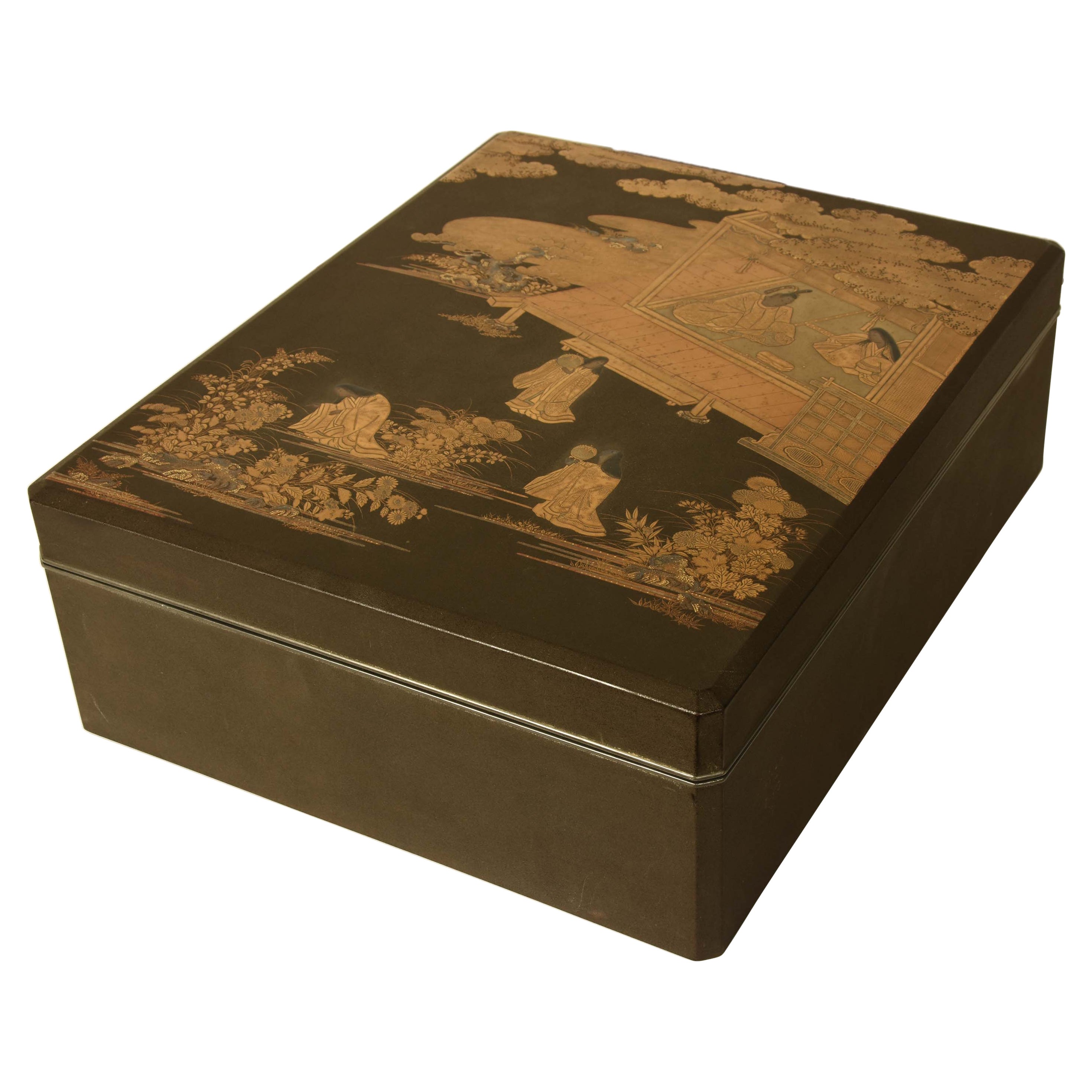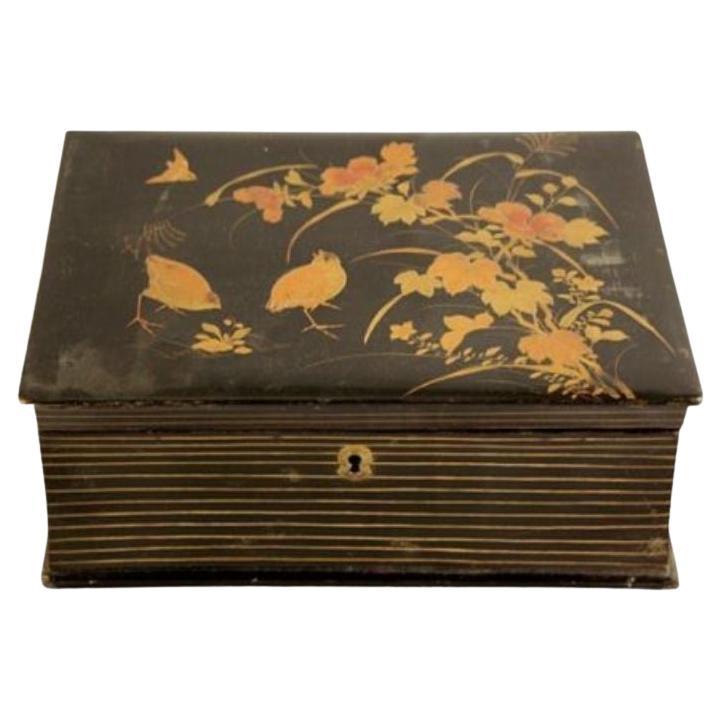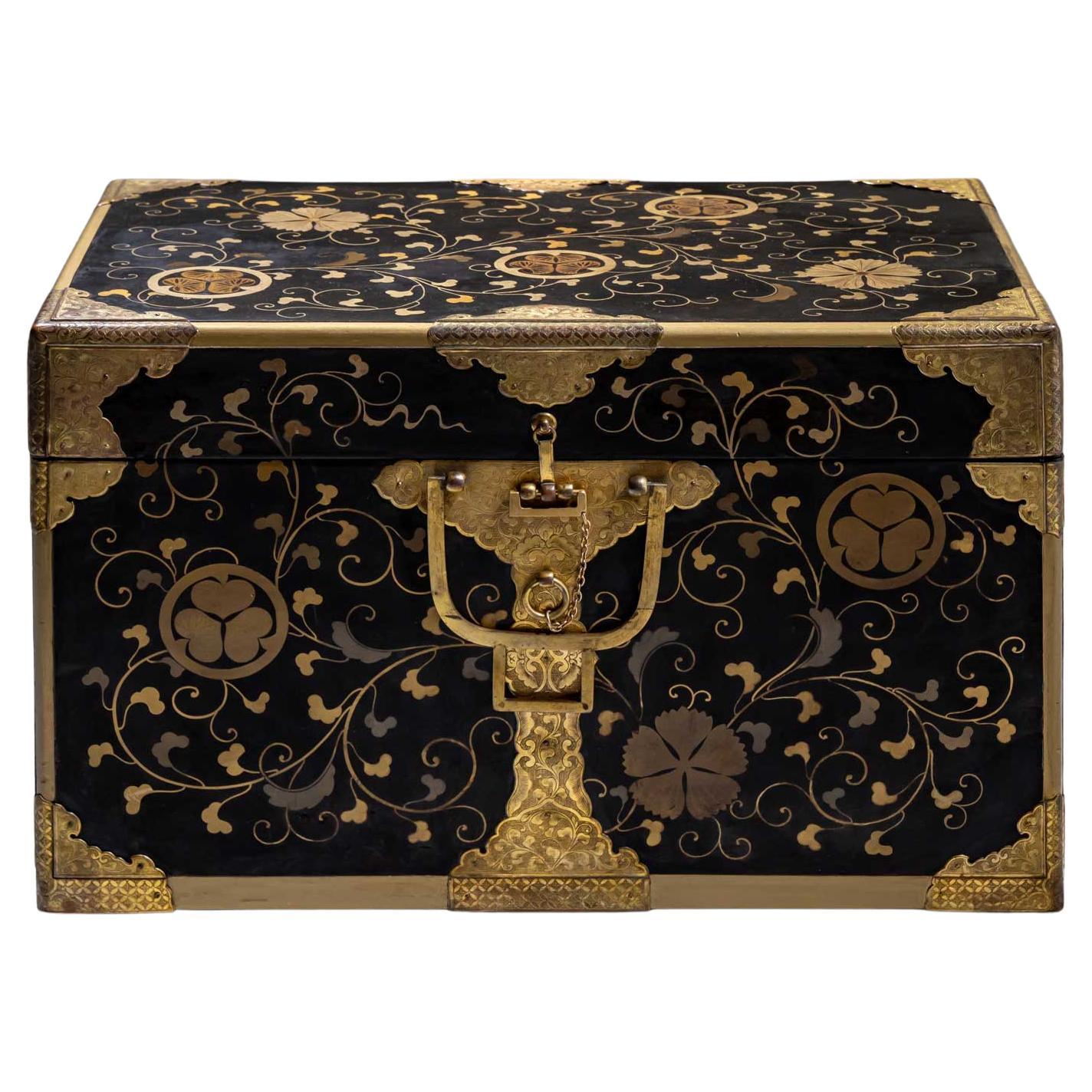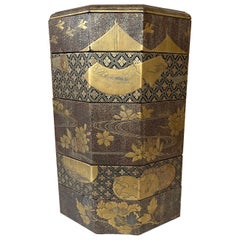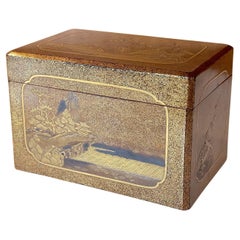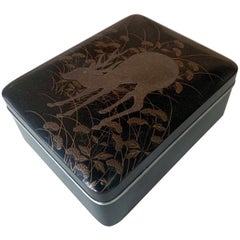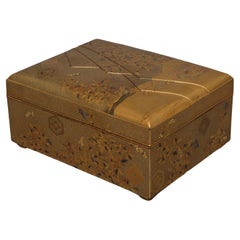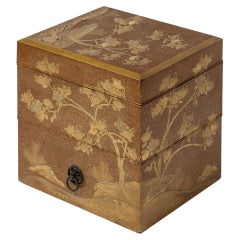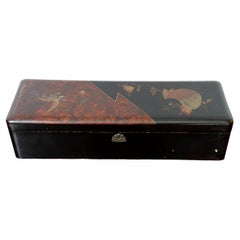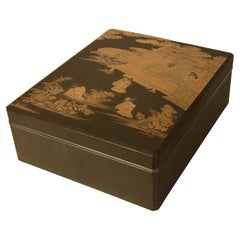Items Similar to Japanese Lacquer Ryoshibako Document Box Meiji Period
Want more images or videos?
Request additional images or videos from the seller
1 of 21
Japanese Lacquer Ryoshibako Document Box Meiji Period
$8,000
£6,106.88
€7,020.27
CA$11,257.43
A$12,518.73
CHF 6,575.11
MX$153,054.03
NOK 81,932.14
SEK 77,239.88
DKK 52,393.89
About the Item
A large Japanese lacquer box with elaborate Maki-e design from Meiji period, (mid-late 19th century). The generous size of the box was reserved for paper document and called Ryoshibako in Japanese. The cover of the lid is decorated with a tour-de-force range of techniques: including low and high relief Maki-e (known as Hiramaki-e and takamaki-e respectively) and gold leaf fundame. Masterfully, the artisan used these approaches to depict a gorgeous flower cart with flowing ribbons. The cart carries a large basket with the most exuberant floral arrangement, showcasing peonies, chrysanthemums, branches of plum blossom, hibiscus, and Japanese irises. The interior of the lid was given an equal if not more poetic rendition, this time, of a Classic Japanese scenery. A flowing river is anchored by rock outcrops and pine trees frame the view point. Flocks of crane fly in the sky and two turtles sun themselves by the bank. The side of the box was all decorated with elaborate floral arrangement. The background Nashiji surface has a reddish glow to mimic the pear skin, with the outside mellowed into a beautiful patina of a pleasing brown hue, compared to the much shinier interior.
This Ryoshibako is, with no doubt, was crafted by a master. From the overall composition, to the attention to details on the smallest scale are just astounding. The stunning condition suggests that it was cherished with utmost care.
- Dimensions:Height: 6.5 in (16.51 cm)Width: 13 in (33.02 cm)Depth: 16.75 in (42.55 cm)
- Style:Japonisme (Of the Period)
- Materials and Techniques:
- Place of Origin:
- Period:
- Date of Manufacture:19th Century
- Condition:Repaired: A couple of small restoration on the fundame gold foil, including a small area on a spoke of the wheel, also on the petal of a flower on the side of the box. See detail images as the repair area has a slightly more shining gold color. Wear consistent with age and use. Minor losses. Fine condition overall, with minor contact wear on the corner and small scratches on the base. Mellowed natural patina on the exterior surface.
- Seller Location:Atlanta, GA
- Reference Number:1stDibs: LU945020575512
About the Seller
4.9
Platinum Seller
Premium sellers with a 4.7+ rating and 24-hour response times
Established in 2006
1stDibs seller since 2010
567 sales on 1stDibs
Typical response time: <1 hour
- ShippingRetrieving quote...Shipping from: Atlanta, GA
- Return Policy
Authenticity Guarantee
In the unlikely event there’s an issue with an item’s authenticity, contact us within 1 year for a full refund. DetailsMoney-Back Guarantee
If your item is not as described, is damaged in transit, or does not arrive, contact us within 7 days for a full refund. Details24-Hour Cancellation
You have a 24-hour grace period in which to reconsider your purchase, with no questions asked.Vetted Professional Sellers
Our world-class sellers must adhere to strict standards for service and quality, maintaining the integrity of our listings.Price-Match Guarantee
If you find that a seller listed the same item for a lower price elsewhere, we’ll match it.Trusted Global Delivery
Our best-in-class carrier network provides specialized shipping options worldwide, including custom delivery.More From This Seller
View AllAntique Japanese Lacquer and Inlay Box from Ryukyu Island
Located in Atlanta, GA
A lacquer presentation box with mother-of-pearl inlays from Japanese Ryukyu Islands circa 17-18th century. The lidded box in rectangular form with rounded corner is a classic example...
Category
Antique 18th Century Japanese Japonisme Lacquer
Materials
Mother-of-Pearl, Lacquer
Japanese Maki-e Lacquer Stack Box Jubako
Located in Atlanta, GA
An antique jubako (stack boxes) with five tiers in an elongated octagon shape circa 19th century (end of Edo or beginning of Meiji period). jubako was traditionally used to store and...
Category
Antique 19th Century Japanese Japonisme Lacquer
Materials
Wood, Lacquer
Exquisite Japanese Lacquer Maki-e Hand Box Kobako Edo Period
Located in Atlanta, GA
An early Japanese lacquer Maki-e decorated kobako (small storage box) circa 18th century (Edo period). Based on its form and size, this kobako was possibly used as a Chabako to store the accoutrements for chado (tea ceremony). The lidded box is of rectangular form with bevel design on all edge that softens the appearance. The entire surface was densely covered with a background of nashiji. Elaborate Maki-e techniques were used on each side to showcase a distinct landscape or floral design within a cartouche panel. On the surface of the lid, a mountainous landscape rises from the edge of the water. The poetic composition is akin to a traditional ink scroll...
Category
Antique 18th Century Japanese Edo Lacquer
Materials
Lacquer
Japanese Rinpa Style Lacquer Box Meiji Period
Located in Atlanta, GA
A black lacquer tebako (hand box) with maki-e decoration and silver trim, circa late 19th century, Meiji period. The surface of the lid features a Rinpa style maki-e paint depicting ...
Category
Antique 1890s Japanese Japonisme Lacquer
Materials
Wood, Lacquer
Japanese Maki-e Lacquer Tray Box with Cutout Design
Located in Atlanta, GA
A Japanese lacquer box with lid and an inner tray decorated with Maki-e on a dense nashiji background. The fine box was likely made circa 1920-30s...
Category
Vintage 1920s Japanese Taisho Lacquer
Materials
Wood, Lacquer
Japanese Namban Lacquer and Inlay Coffer Momoyama Period
Located in Atlanta, GA
A rare Japanese Namban Lacquer domed coffer circa 1570-1610s of Azuchi-Momoyama to early Edo period. These types of lacquerware were made for export to ...
Category
Antique 16th Century Japanese Japonisme Lacquer
Materials
Wood, Lacquer
You May Also Like
Exceptional Japanese Gold Lacquer Tebako 手箱 'Box for Personal Accessories'
Located in Amsterdam, NL
Exceptional Japanese rectangular gold lacquer tebako (box for personal accessories) with a slightly domed well-fitted lid and raised by four low bracket feet. The lid finely carved with pointed shapes as if it is covered by folded papers.
On top of this embossed surface it is decorated with gold and silver hiramaki-e (low-relief design) and takamaki-e (high-relief design) depicting a wild winding river landscape with along the waterfront...
Category
Antique 19th Century Japanese Lacquer
Materials
Giltwood, Lacquer
Japanese Lacquered Tebako 'Box'
Located in PARIS, FR
Tebako box with three compartments in golden and nashi-ji lacquer, decorated with golden, red, and kirigane lacquer, golden persimmon tree leaves, among rocks. The compartments are of increasing size from the top. The decoration is in continuity.
Persimmon has been cultivated in southern China for more than 2500 years and is believed to have been introduced to Japan in the 8th century. The veneer is a tree with very hard wood, similar to ebony. According to a legend, one specimen survived the atomic bombing of Nagasaki on August 9, 1945, close to the epicenter. It is therefore in Japan a symbol of strength and longevity. It is also the national fruit of the country. It is eaten as a traditional dish during New Year's Day celebrations.
Tebako literally means "portable box...
Category
Antique 1860s Japanese Lacquer
Materials
Lacquer
Japanese Maki-e Lacquered Box, Ric.049
Located in Norton, MA
Japan, Edo to Meiji period, a long rectangular document box with hinged cover, decorated with a bird and a floral basket,
The locker is not functioning.
Category
Antique 19th Century Japanese Decorative Boxes
Materials
Lacquer
Superb Japanese Black Lacquer Document Box with Gold Maki e Design, Meiji Period
Located in Prahran, Victoria
An antique black lacquer document box with an exquisitely detailed, finely wrought design from The Tale of the Genji depicted in gold maki e across the lid. Internally, the box is de...
Category
Early 20th Century Japanese Lacquer
Materials
Wood, Lacquer
$5,200 Sale Price
20% Off
Japanese Lacquer Box, 1900
Located in Marseille, FR
Japanese lacquer box 1900 decorated with sparrows, gold lacquer on a black background of very good quality, good general condition. The dimensio...
Category
Antique 19th Century Decorative Boxes
Materials
Lacquer
Japanese Lacquer Chest, Edo Period
Located in Greding, DE
Small rectangular Japanese chest with gold lacquer decoration in the form of leaf tendrils. The chest is decorated with cut-out and ornamentally engraved fittings on the corners and ...
Category
Antique 18th Century Japanese Edo Decorative Boxes
Materials
Brass
More Ways To Browse
Antique Document
Antique Paper Documents
Framing Antique Documents
Japanese Lacquered Art
Antique Lacquer Box
Antique Lacquer Boxes
Japanese 19th Century Lacquer
Japanese Lacquer Boxes
Japanese Lacquer Meiji
Lacquered Large Boxes
Large Lacquer Box
Wood Carrying Box
Japanese Meiji Period Box
Antique Document Box
Japanese Gold Lacquer Box
Japanese Iris
Meiji Cranes
Turtle Box

